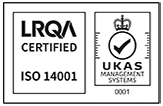When hiring a skip, it can be difficult to guess how much waste your domestic or commercial project will produce. But predicting this as accurately as you can will help to determine the size of skip you should hire, as overfilling your skip can pose serious safety risks, as well as legal and financial consequences.
This blog will explain why skips should never be overfilled and provide guidance on how to avoid overloading.
How much waste is too much?
Generally, the sides or ‘walls’ of the skip indicate its capacity level and waste should not be stacked any higher. This prevents overloading the skip, which could lead to the skip hire company refusing to collect it and charging a penalty fee. You might also have to unload it and hire another skip to remove all your waste.
Skips come in a variety of sizes, ranging from mini skips, which start at 2 yards, up to ‘roll on roll off’ (RORO) skips which measure up to 40 yards. Each size comes with a recommended capacity, normally measured by the approximate number of bin bags each can hold. Mini skips will hold up to 20 bags, whilst the largest size of RORO skips will hold up to 800 bags. Some skips will be marked with a thick red line towards the top along the skip walls to indicate their specific capacity limit.
See our easy reference style infographic for exact skip sizes, their capacity and which type of jobs they are typically suited to here
Reasons to avoid overloading a skip
Cost
Overloading your skip could lead to excessive weight charges, which can vary depending on the skip hire company and the specific terms of your hire agreement. Fines for overloading can range from £50 to £150, depending on the extent of the overloading. Alternatively, your skip hire company may charge you extra for the additional period that you have the skip while you get it to the acceptable loaded capacity.
Safety
When it comes to safety, overloaded skips pose several risks:
- Spillage: Overloaded skips can cause waste to spill over the sides, creating hazards for pedestrians, cyclists and motorists, potentially causing accidents and injuries.
- Instability: Excess weight, especially if unevenly distributed, can make the skip unstable and cause it to tip over, particularly during removal or transportation.
- Difficulty in transporting: Overloaded skips can be difficult and unsafe to transport. The vehicle transporting the skip might become unbalanced or exceed legal weight limits, increasing the risk of accidents.
- Damage to surroundings: Overfilled skips can damage roads, pavements and driveways, with the additional weight potentially causing cracks, potholes or other structural damage.
- Injury to skip hire staff: Workers who handle overloaded skips are at a higher risk of injury due to the increased weight and potential instability of the load. Lifting or manoeuvring heavy objects can lead to strains, sprains or more severe injuries.
Prepare for the arrival of your hired skip by reading our skip hire safety post here
Laws
Several laws and regulations apply to overloaded skips and skips filled with protruding items. The 1980 Highways Act, Section 140 states that skips causing an obstruction or danger will be removed or repositioned. Overloaded skips also risk violating the 1986 Road Vehicles (Construction and Use) Regulations on vehicle weight limits and safe transportation practices.
The Health and Safety at Work Act (1974) requires employers, including skip hire companies, to ensure the health and safety of their employees and the public. Overloaded skips pose significant health and safety risks, potentially leading to legal action if an incident occurs. In addition, under the Environmental Protection (Duty of Care) Regulations 1991, businesses and individuals must ensure that waste is handled and disposed of properly.
Failure to comply with these regulations can result in fines and persistent non-compliance can result in legal action, including prosecution and more substantial fines. To ensure compliance, it’s essential to follow the guidelines provided by the skip hire company, stick to regulations and avoid overloading skips. Proper loading techniques, applying for the necessary permits and understanding weight limits are crucial steps in reducing safety risks and legal consequences.
Neighbours
Neighbours of your commercial or residential site can also be negatively impacted by an overloaded skip.
- Physical risks: Items falling from the skip can cause trips, slips and falls. A skip with protruding waste can block pathways, driveways or access routes, making it difficult for neighbours to move around safely.
- Attracting pests: Overfilled skips, particularly those containing organic waste, can attract pests such as rats, mice and insects, leading to potential health hazards and nuisance.
- Environmental impact: Spilled waste can contaminate soil and water sources, affecting local wildlife and plant life.
- Aesthetic issues: An overloaded skip can be unsightly and diminish the visual appeal of the neighbourhood, potentially reducing property values. Decomposing waste in an overloaded skip can produce unpleasant smells, affecting the quality of life for nearby residents.
- Legal and financial consequences: Neighbours might file complaints with local authorities, leading to inspections and potential fines for the skip user. If an overloaded skip causes damage to a neighbour’s property or results in personal injury, the person responsible for the skip could face legal action and financial liability for damages.
How to avoid overloading a skip
Know your limits
A useful tip to avoid overloading your skip is to know the limits:
- Understand skip sizes and capacities.
- Estimate your waste volume by creating a waste management plan and hire a slightly larger skip than you think you’ll need to prevent the need for additional skips.
- Sort and organise your waste into categories to maximise space in your general waste skip. For example, wood waste is best disposed of on wood-only skips. And remember that items containing Persistent Organic Pollutants (POPs), such as mattresses and other upholstered domestic seating, cannot be put in a skip but must be taken to an authorised treatment plant.
- Where possible, break heavy items, such as furniture (that do not contain POPs) into smaller, more manageable pieces to maximise space and avoid protrusions.
- Be mindful of the weight of heavy items such as soil, bricks and concrete. Distribute these evenly across the skip, compacting as much as possible and filling any gaps to avoid exceeding the maximum fill height.
Choose a suitable skip size
If you are unsure of which skip size to hire, don’t hesitate to seek professional advice. Some skip hire companies provide guidance on waste volume and skip capacity to assist their customers in making informed decisions about skip size and usage. In your search for a reliable provider, check their website for guidance on skip capacity and contact them to discuss the finer details of your project requirements before hiring.
Effective and cost-efficient waste disposal
Skips offer a safe and efficient solution for waste removal, catering to projects of all scales, from commercial sites to smaller domestic jobs. However, overloading a skip poses severe risks, including toppling, damage to the skip and surroundings, and potential personal injury.
In answer to the question “Can I overload a skip?”, there are compelling legal, safety and financial reasons to avoid doing so at all costs. Understanding different skip sizes, their weight limits and capacities, along with consulting with the skip hire company, ensures selecting the right size while staying within safe parameters. Prioritising safety and compliance through proper guidance guarantees effective waste management without compromising on legal or safety standards.
Find out more about our wide range of skips available to hire here
Rabbit Skip Hire:
Rabbit Skip Hire is an established and expert supplier of skips for commercial and domestic projects of all sizes throughout East and West Sussex.
To find out more about Rabbit Skip Hire’s reliable and expert skip hire contact our expert and friendly team on 01903 762020, email info@rabbitgroup.co.uk or fill out our online skip hire contact form.
Rabbit Skip Hire is part of Rabbit Waste Management, which includes Rabbit Demolition.





